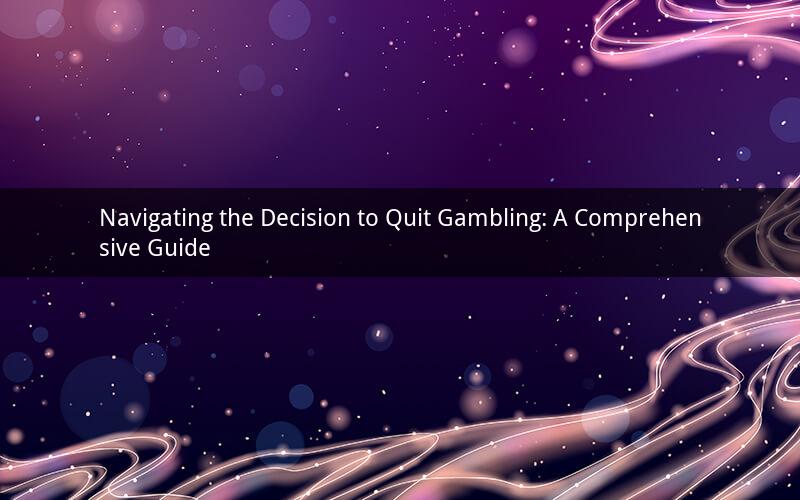
Gambling, while offering thrilling experiences, can easily spiral into an uncontrollable habit. The question of whether or not one should quit gambling arises frequently among individuals grappling with its consequences. This guide delves into various aspects to help you make an informed decision about quitting gambling.
Understanding the Impact of Gambling
1. Financial Consequences: The allure of winning big often leads to spending beyond one's means. This can result in significant financial strain, including debt and the potential loss of assets.
2. Emotional Well-being: Problem gambling can cause immense stress, anxiety, and depression. It can also strain relationships with family and friends, leading to feelings of isolation.
3. Social Implications: Individuals who gamble excessively may become socially isolated, as their focus shifts from relationships to the thrill of winning.
Signs That Indicate It's Time to Quit Gambling
1. Financial Difficulty: If you're constantly facing financial troubles due to gambling, it's a strong indicator that you need to reconsider your gambling habits.
2. Emotional Strain: If gambling is causing you stress, anxiety, or depression, it's a clear sign that you need to quit.
3. Strained Relationships: If gambling is impacting your relationships with family and friends, it's crucial to quit to save your social life.
Strategies for Quitting Gambling
1. Self-Reflection: Take a moment to reflect on why you gamble and what triggers your urge to gamble. This self-awareness can help you address the root causes.
2. Create a Budget: Establish a budget and stick to it. This can help you manage your finances and prevent overspending.
3. Seek Support: Join a support group or find a therapist who specializes in gambling addiction. Sharing your struggles and receiving professional help can make a significant difference.
4. Replace Negative Habits: Find healthier activities to replace gambling. This could be exercising, reading, or engaging in a hobby.
5. Set Realistic Goals: Set achievable goals for yourself and celebrate when you meet them. This can help keep you motivated and focused on quitting gambling.
Overcoming Challenges While Quitting Gambling
1. Cravings: It's normal to experience cravings when trying to quit gambling. Stay strong and remember why you're quitting.
2. Triggers: Identify situations or environments that trigger your urge to gamble and try to avoid them as much as possible.
3. Relapses: Don't be discouraged by relapses. Instead, learn from them and keep moving forward.
Long-Term Benefits of Quitting Gambling
1. Financial Stability: Quitting gambling can lead to improved financial stability, allowing you to enjoy a better quality of life.
2. Improved Emotional Well-being: Without the stress and anxiety caused by gambling, you'll likely experience better mental health.
3. Strengthened Relationships: By quitting gambling, you can rebuild and strengthen your relationships with family and friends.
Frequently Asked Questions (FAQs)
Q1: How do I know if I have a gambling problem?
A1: If you're struggling to control your gambling habits, experiencing financial, emotional, or social problems due to gambling, or if you're lying about your gambling activities, you might have a gambling problem.
Q2: Can I quit gambling on my own?
A2: It's possible to quit gambling on your own, but seeking professional help can significantly improve your chances of success. Support groups, therapists, and counseling services can provide valuable guidance and support.
Q3: What are the withdrawal symptoms of quitting gambling?
A3: Withdrawal symptoms from quitting gambling can include irritability, restlessness, anxiety, depression, and insomnia. These symptoms usually subside within a few weeks.
Q4: Can I gamble responsibly?
A4: Responsible gambling is possible, but it requires self-discipline and the ability to recognize when to stop. Setting limits on time and money spent on gambling can help you gamble responsibly.
Q5: How can I support a loved one who's struggling with gambling addiction?
A5: Encourage your loved one to seek professional help, offer emotional support, and be patient. Educating yourself about gambling addiction can also help you better understand and support your loved one's journey to recovery.